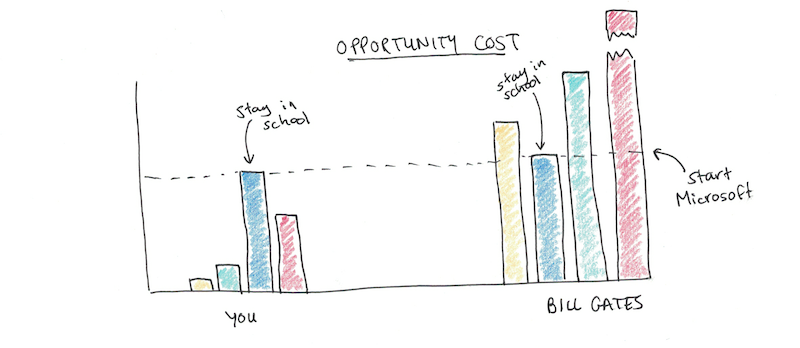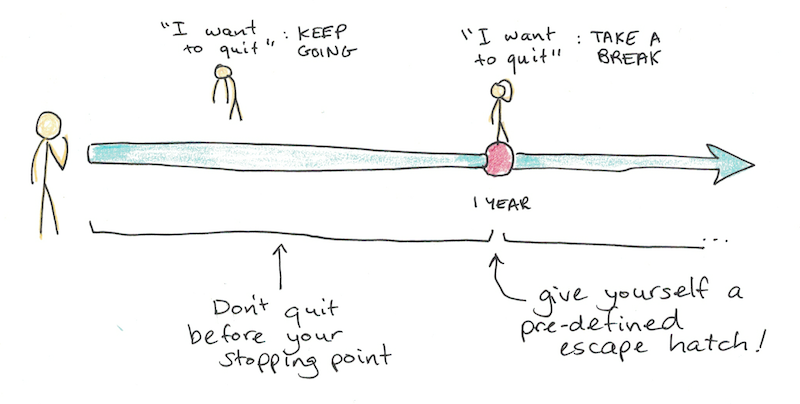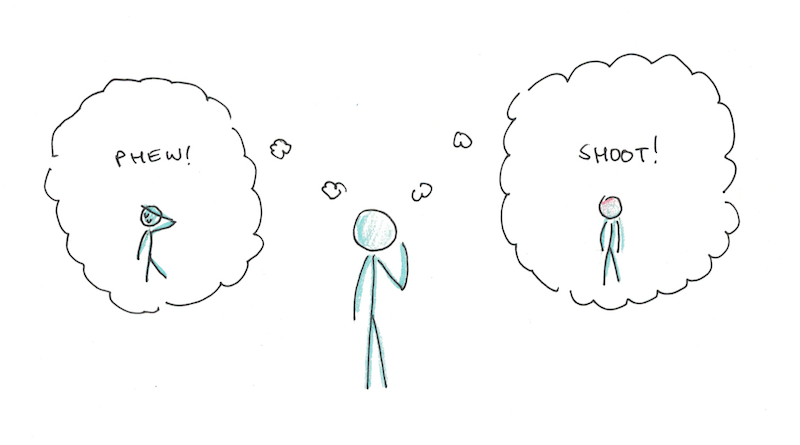There are plenty of great stories of persistence.
J.K. Rowling living on welfare, while writing Harry Potter.
Thomas Edison and his team, attempting thousands of different materials, before eventually settling on tungsten filaments for the lightbulbs that created an industrial empire.
Albert Einstein, failing to find work in physics, dreaming up his revolutionary ideas for physics in the Swiss patent office.
What we rarely hear are the stories whose moral is that the person should have just given up.
But these stories also exist. They’re just not as celebrated, although, perhaps they should be.
Famous Figures Who Should Have Given Up
Consider Isaac Newton. Famous for discovering the law of gravity that unites apples falling and the planets orbits. Yet, he spent years trying to decipher strange numerological codes hidden in the Bible that he thought could give him the recipe for turning lead into gold.
Or what about Elizabeth Holmes and her bogus blood-testing company, Theranos? She had ambition and persistence in abundance. But had she paused to reconsider earlier, she might have readjusted that drive into a product that wasn’t a sham, defrauding investors of billions.
Even Alexander the Great died at an early age because he pushed his empire too wide and thin, rather than stopping while he was ahead.
The Problem with Persistence
Every decision you make to keep going faces a trade-off. On the one hand, by quitting too early and too often, you never get past the hard parts and into the areas where your effort may pay off.
The easy spaces in life, with guaranteed wins for little effort, are crowded. It’s only once you venture past this, where you need persistence, vision and drive, do you start seeing rewards. When things are easy, everyone is doing them, so you want to go where things are hard enough to make it worth your time.
On the other hand, failing to quit is a failure to learn. Sometimes your ideas and vision don’t match reality. What you’re trying to do isn’t going to work, staying stubbornly in the same direction can cost you much more than just pride.
How to Decide Whether or Not to Give Up
I’ve been in a position multiple times in my life where things seem to not be working out, and I have to consider whether I should keep going or give up.
One of the biggest decisions for me was whether to keep writing almost a decade ago. I had been trying to work my way into a sustainable income for myself for several years working part time, and it hadn’t worked out yet. After a particularly bad failure with a project I had worked on, I considered giving up altogether, trying out something new.
In the end, however, I decided to keep going. The twist was that this was only a few months before I finally found the business model that would allow me to earn a full-time income, and I have ever since.
In other cases however, persistence didn’t win out. I started a book club nearly two years ago, but after fourteen months, I wasn’t happy with how the format was working out, so I gave up so I could have time to work on other projects instead.
Between these, there’s been a ton of moments where I’ve had to make judgement calls about whether or not to keep going, and the choice is rarely clear cut. Below, I’d like to outline the decision process I use for making the tough call to keep going or quit:
1. Do You Have an Obviously Better Opportunity?

Decisions aren’t made in isolation. You’re always comparing doing something to doing something else. Even “do nothing” is something, since you’ll fill your time with watching television or hanging out with friends.
A good question, therefore, when you’re weighing whether or not to continue is if you have a clear idea of what you’d do instead. Sometimes a project is hitting a rough patch, but it’s still the best idea you have of how you’ll reach your goals—you just need to push through.
This was my reasoning when I decided to keep writing. I couldn’t see anything else that was a better opportunity at the time, even though I was getting discouraged.
2. What Did You Commit To?

One mental tool I use a lot to stick to hard things is to predefine my commitment before starting. That way, I don’t depend on momentary frustrations to make big decisions to quit or continue, but a different rule of thumb.
This was my reasoning behind giving up the book club. I had started it with a specific commitment to go for one year. After that yearlong effort, I felt it wasn’t what I wanted. The amount of work required to make each one was relatively high (compared to blog articles), the amounts of views for each episode were lower than I’d like, and it was more like a book review than a book club, as most months didn’t have many people other than me reading along with the book.
In this case, however, I was fine with giving it up because I had tried it out for the period I was committed to. If I had been feeling this way at the six month mark, I probably would have pushed forward because six months didn’t feel like enough time.
3. Would Your Future Self Feel Regret or Relief?

This is a hard question, since it depends on imagining your future emotions in a way that isn’t always possible. However, I do like this approach to evaluating big decisions because it makes use of your intuition (as opposed to just your rational mind, which may be inadequate) as well as force you to see above momentary hiccups and focus on the big picture.
If I feel like future-me would regret the decision, I usually commit to a bit more. Pick a spot out, either in time (say 6 months more work) or a certain milestone (after graduation) and push to that spot and reevaluate.
In contrast, if I imagine future-me would feel like it’s a relief, that with more emotional distance I’d recognize that I was in a bad relationship, project, obsession or mindset, that’s probably a good reason to believe that giving up is good. Sometimes we get overly attached to our current plans and fear giving them up for the unknown. But if you expect future-you to feel relief about it, then you’re probably wise to give it up now.
Do You Need to Give Up? Or Just Take a Break?
Fatigue, anxiety and frustration can all put you in emotional states that make it hard to keep going. However, sometimes the problem is just that—a momentary emotion.
If whatever you’re considering giving up is important, and you’ve invested a lot of time already, I strongly suggest starting with a brief break. A semester off school. A leave of absence at work. A vacation to clear your head.
Once you get back to a more neutral mindset, you can reexamine your feelings and see if they want you to get back up and continue the old path, or if the distance reinforces your decision to give it all up.
Whatever you do, recognize that there’s no perfect solution to these problems in life. You’ll always make decisions under uncertainty. The choice is yours to make.

 I'm a Wall Street Journal bestselling author, podcast host, computer programmer and an avid reader. Since 2006, I've published weekly essays on this website to help people like you learn and think better. My work has been featured in The New York Times, BBC, TEDx, Pocket, Business Insider and more. I don't promise I have all the answers, just a place to start.
I'm a Wall Street Journal bestselling author, podcast host, computer programmer and an avid reader. Since 2006, I've published weekly essays on this website to help people like you learn and think better. My work has been featured in The New York Times, BBC, TEDx, Pocket, Business Insider and more. I don't promise I have all the answers, just a place to start.